沪教牛津版八年级英语下册语法精讲及练习
最新沪教牛津版八年级下Unit7 讲解与练习
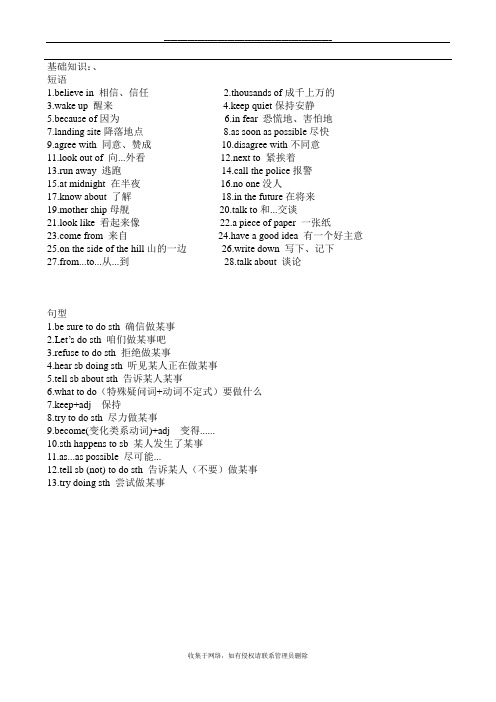
基础知识:、短语1.believe in 相信、信任2.thousands of成千上万的3.wake up 醒来4.keep quiet保持安静5.because of因为6.in fear 恐慌地、害怕地nding site降落地点8.as soon as possible尽快9.agree with 同意、赞成10.disagree with不同意11.look out of 向...外看12.next to 紧挨着13.run away 逃跑14.call the police报警15.at midnight 在半夜16.no one没人17.know about 了解18.in the future在将来19.mother ship母舰20.talk to和...交谈21.look like 看起来像22.a piece of paper 一张纸e from 来自24.have a good idea 有一个好主意25.on the side of the hill山的一边26.write down 写下、记下27.from...to...从...到28.talk about 谈论句型1.be sure to do sth 确信做某事2.Let’s do sth 咱们做某事吧3.refuse to do sth 拒绝做某事4.hear sb doing sth 听见某人正在做某事5.tell sb about sth 告诉某人某事6.what to do(特殊疑问词+动词不定式)要做什么7.keep+adj 保持8.try to do sth 尽力做某事9.become(变化类系动词)+adj 变得......10.sth happens to sb 某人发生了某事11.as...as possible 尽可能...12.tell sb (not) to do sth 告诉某人(不要)做某事13.try doing sth 尝试做某事语法:原因状语从句和because of的用法(1). Since no one else saw these aliens, I refuse to believe you..(2). We went there because I heard a loud noise last night.(3). I’m unhappy because of your marks in the exam!句子(1)中含有since引导的原因状语从句,句子(2)中含有because引导的原因状语从句,句子(3)中含有because of短语。
沪教版八年级英语下册--各单元知识点及复习
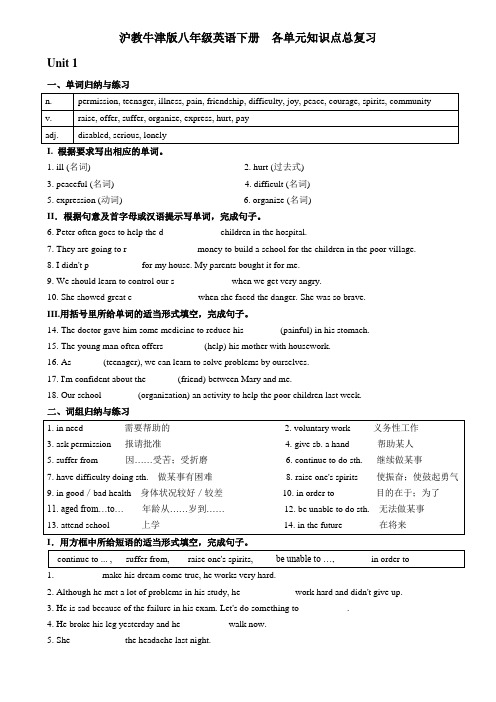
沪教牛津版八年级英语下册各单元知识点总复习Unit 1一、单词归纳与练习I. 根据要求写出相应的单词。
1. ill (名词) ____________________2. hurt (过去式) ____________________3. peaceful (名词) ____________________4. difficult (名词) ____________________5. expression (动词) ____________________6. organize (名词) ____________________ II.根据句意及首字母或汉语提示写单词,完成句子。
6. Peter often goes to help the d____________ children in the hospital.7. They are going to r_______________ money to build a school for the children in the poor village.8. I didn't p___________ for my house. My parents bought it for me.9. We should learn to control our s____________ when we get very angry.10. She showed great c______________ when she faced the danger. She was so brave.III.用括号里所给单词的适当形式填空,完成句子。
14. The doctor gave him some medicine to reduce his _______ (painful) in his stomach.15. The young man often offers ________ (help) his mother with housework.16. As ______ (teenager), we can learn to solve problems by ourselves.17. I'm confident about the ______ (friend) between Mary and me.18. Our school _______ (organization) an activity to help the poor children last week.二、词组归纳与练习I.用方框中所给短语的适当形式填空,完成句子。
沪教牛津版八年级下unit5讲解与练习
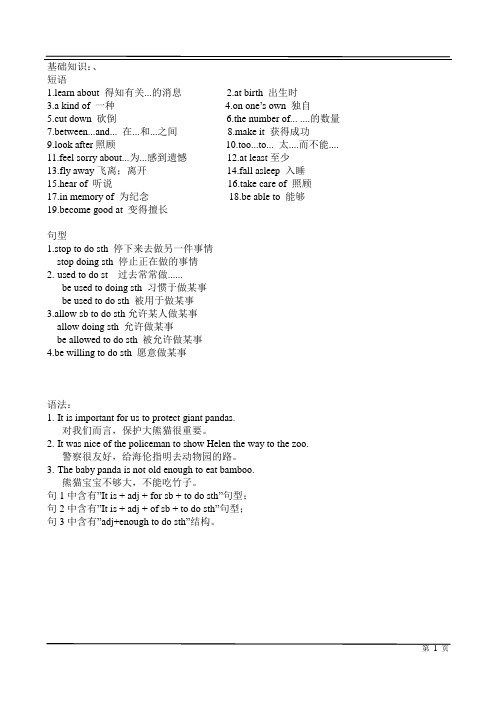
基础知识:、短语1.learn about 得知有关...的消息2.at birth 出生时3.a kind of 一种4.on one’s own 独自5.cut down 砍倒6.the number of... ....的数量7.between...and... 在...和...之间8.make it 获得成功9.look after照顾10.too...to... 太....而不能....11.feel sorry about...为...感到遗憾12.at least至少13.fly away飞离;离开14.fall asleep 入睡15.hear of 听说16.take care of 照顾17.in memory of 为纪念18.be able to 能够19.become good at 变得擅长句型1.stop to do sth 停下来去做另一件事情stop doing sth 停止正在做的事情ed to do st过去常常做......be used to doing sth 习惯于做某事be used to do sth 被用于做某事3.allow sb to do sth允许某人做某事allow doing sth 允许做某事be allowed to do sth 被允许做某事4.be willing to do sth 愿意做某事语法:1.It is important for us to protect giant pandas.对我们而言,保护大熊猫很重要。
2.It was nice of the policeman to show Helen the way to the zoo.警察很友好,给海伦指明去动物园的路。
3.The baby panda is not old enough to eat bamboo.熊猫宝宝不够大,不能吃竹子。
句1中含有”It is + adj + for sb + to do sth”句型;句2中含有”It is + adj + of sb + to do sth”句型;句3中含有”adj+enough to do sth”结构。
沪教牛津版八年级下册英语Unit8Life in the future知识点讲解与练习

沪教牛津版八年级下Unit 8 L i fe in t he fu t ure讲解及练习一、词汇1.apology n.道歉I don’t believe their apologyapologize v.道歉apologize to sb 向某人道歉=make an apology to sbYou should apologize to your mother.= You should make an apology to your mother.apologize for sth 为某事道歉I should apologize for what I said.2.present n.目前、现在We talked about the past and the present.present adj.出席的、现在的How many people were present at the meeting?present v.呈现They presented him with a bunch of flowers.present n.礼物He often gave his neighbor’s kids little presents.at present=in the present 现在、目前I don’t have enough money in hand at present.3.satisfy v.使满意They will satisfy everyone.Some people are hard to satisfy.satisfied adj=pleased 满意的be satisfied with sb/sth 对某人/某事......满意Our teachers are satisfied with us.4.mix v.(使)混合The hydrogen in the car is mixed with oxygen from the air to make electricity for the car.If you mix blue and yellow, then you will get green.mixture n. 混合物、混合体、混合剂He says his new play is a mixture of sadness and happiness.5.relax v.放松、休息Then you can relax as the car takes you there.Whenever he gets home from work, he loves to relax with a glass of wine.relaxed adj.感到放松的(人)relaxing adj.令人放松的(物)They felt quite relaxed before the examination.After a day’s hard work, we all enjoyed a relaxing drink.6.while conj 与...同时;但是;然而Jack was doing his homework in the study while his mother was cooking in the kitchen.The first two services are free, while the third costs $ 35.when和while的区别(1)when=at or during the time that,既可以指时间点,也可以指一段时间,while=during the time that,只能指一段时间,因此,when引导的时间状语从句中的动词可以是短暂性动词也可以是延续性动词,而while 后面则只能是延续性动词。
2020-2021学年牛津上海版八年级下学期英语语法专项讲解及训练(有答案)

2020学年牛津上海版八年级第二学期英语专项讲解及训练I. 情态动词(有词义, 与动词原形一起组成谓语, 无人称与数的变化)can, may, must, need, should, shall, will, could, would, ought toFish can swim.Can I help you?May I leave early? No, you may not.May I smoke here? No, you mustn’t.Must I finish it today? No, you needn’t.You should pay more attention about your health.Shall I book the tickets for you?Can/Could/Will/Would you help Linda with her physics this weekend?You oughtn’t to go there alone.注意: should=ought to都是情态动词can=be able to must=have to mustn’t=be not allowed to needn’t=not have to但be able to, have to, 有时态、人称与数的变化,中考真题:1.A: Must I get up early tomorrow, Dad?B: No, you ______. Tomorrow is Sunday.A. can’tB. mustn’tC. needn’tD. couldn’t2.A: ______ I have some chocolates now?B: No, you ______. It’s time for bed. You can have some tomorrow.A. May…mustn’tB. Must…needn’tC. Must…mustn’tD. May…needn’t3.After a long walk, the old man ______ be tired now.A. canB. mustC. has toD. need4. Even the top students in our cla ss can’t work out this problem, so it ______ be very difficult.A. mayB. mustC. canD. need5. Computers ______ process difficult problems very, very quickly.A. mustB. needC. shouldD. can6. Cars, buses and bikes ______ stop when the traffic lights change to red.A. canB. mayC. mustD. need7. Susan’s parents have bought a large house with a swimming pool. It ______ be very expensive.A. mustB. canC. mustn’tD. can’t8. We ______ keep the new traffic law and learn how to protect ourselves.A. mayB. shouldC. canD. need9.-- ______ I fill in the check-in form right now, sir?-- No, you needn’t. You can complete it this afternoon.A. MayB. CanC. WouldD. Must答案:CABBD CABDII. Fill in the blanks with the given words in their proper forms(用所给单词的适当形式填空,每空格限填一词) :1.The old people and children _________ (should take) good care of.2.The letter __________ (must post) at once.3.Now many kinds of work __________ (can do) by robots.答案:1. should be taken 2.must be posted 3.can be doneIII. Rewrite the sentences as required (按要求改写句子,每空格限填一词):1.We can store a lot of information in the computer. (改为被动语态)A lot of information _______ _______ stored in the computer.2.Mrs. White told Tom that he mustn’t throw paper on the ground. (保持原句意思)Mrs. White told Tom _______ ______ throw paper on the ground.3.I don’t know when we shall leave for Nanjing. (保持原句意思)I don’t know when ______ ______ for Nanjing.4.We must keep the noise under 50 dbs (分贝)here. (改为被动语态)The noise must ______ ______ under 50 dbs here.答案: 1. can be 2. not to 3. to leave 4.be kept[ 同步精练]I. Choose the best answer(选择最恰当的答案):( )1. A: ________ I take the book out?B: Yes, but you ________ return it before next Thursday.A. Can, mayB. May, mustC. May, needD. Need, must ( )2. You made quite a few mistakes in the test. You ________ be more careful next time.A. canB. mayC. shouldD. mustn’t ( )3. A: ________ I go and get some sugar? B: Yes, please.A. MustB. ShallC. CouldD. Would( )4. She is glad to find that her daughter ________ sing so well.A. mustB. canC. mayD. need( )5. He has worked the whole day. He _______ be very tired.A. can’tB. mustn’tC. canD. must( )6. Mum, you _______ help me. I can manage it by myself.A. don’t needB. needn’tC. mustn’tD. can’t( )7.A: ______ I make the decision right now?B: No, you _______. You can think it over for a couple of days.A. May, may notB. Must, mustn’tC. May, mustn’tD. Must, needn’t ( )8. Both passengers and cars _________ stop when the traffic lights are red.A. canB. mustC. mayD. need ( ) ( ) 9. Excuse me, sir. Can children under the age of ten ride bicycles in the city?B: No. According to the law, they _________.A. may notB. mustn’tC. shouldn’tD. needn’t答案:BCBBD BDBBIII. Rewrite the sentences as required (按要求改写句子,每空格限填一词):1.The teachers teach Japanese and French in the private school. (改为被动语态)Japanese and French ______ ______ in the private school.2.We must finish the work in two days. (改为被动语态)The work ________ _______ finished in two days.3.Can you see the mice running in the cave? (改为被动语态)Can the mice ________ _______ in the cave?4.Factories mustn’t let out dirty smoke into the air. (保持原句意思)Dirty smoke mustn’t _______ ________ out into the air.5.Few people can work out the difficult problem. (保持原句意思)The difficult problem ______ ______ worked our by few people.6.You mustn’t use dirty words. (保持原句意思)You ______ ______ to use dirty words.7.We needn’t worry about our future too much. (保持原句意思)We ______ ______ to worry about our future too much.答案:1.are taught 2.must be 3.be seen 4.be let 5.can be 6.aren’t allowed7.don’t needII. 宾语从句:(重点掌握语序、时态、连接词)We know (that) there is no air or water on the moon.She said (that) someone had stolen it from her house a month before.She asked me whether/ if they would come.He isn’t sure what electricity is.Could you tell me who you are?I wondered when and where the concert would be held.Do you know why he was late for the meeting?She doesn’t even know how old she is.[ 中考真题]I. Choose the best answer(选择最恰当的答案):1.He didn’t remember ______ his watch.A. where he had putB. where he has putC. where had he putD. where has he put2.I don’t know ______ last night.A. why they didn’t go to the mo viesB. when they didn’t go to the moviesC. why didn’t they go to the moviesD. when didn’t they go to the movies3.The old man wondered ______.A. whether the American pilot had seen UFOsB. whether had the American pilot seen UFOsC. how had the American pilot seen UFOsD. that the American pilot had seen UFOs4.He hasn’t decided ______.A. if he’ll go on a trip to WuxiB. when will he go on a trip to WuxiC. if he goes on a trip to WuxiD. when does he go on a trip to Wuxi5.Miss Li wants to know ______ next week.A. when my uncle leavesB. when will my uncle leaveC. where my uncle will stayD. where does my uncle stay6.He asked me ______ during the winter holidays.A. where I had goneB. where I had beenC. where had I goneD. where had I been7.Will you please tell me ______?A. where Pudong Airport isB. how far Pudong Airport wasC. how can we get to Pudong AirportD. when was Pudong Airport built8. I’d like to know ______.A. when will he give back the tapeB. whether has he received higher educationC. that he has been busyD. whether she will join in our English Evening9. Professor Nelson wanted to know _______________.A. when would the conference beginB. when the conference would beginC. when will the conference beginD. when the conference will begin答案:AAAAC BADBII. Rewrite the sentences as required (按要求改写句子,每空格限填一词):1. The words on the notice board are very small.I can’t see them clearly. (两句并一句)The words on the notice board are _______ small _______ I can’t see them clearly.2. Put on your coat, or you’ll catch a cold. (保持原句意思)______ you ______ put on your coat, you’ll catch a cold.3. I won’t go with you unless you help me do the washing. (用if改写句子)I won’t go with you ______ you _____ help me do the washing.I ________ go with you _______ you help me do the washing.4. The boy asked his mother, “ Does water freeze at 0℃?”(保持原句意思)The boy asked his mother _______ water _______ at 0℃.5. The ice cream will melt, so you’d better put it in the fridge at once. (保持原句意思)The ice cream will melt _______ you _______ put it in the fridge at once.6. Jack’s mother asked him, “ Have you packed your things?” (改为宾语从句)Jack’s mother asked him ______ he ______ packed his things.7. The poor child was so lucky that she received many books from Project Hope. (改为简单句)The poor child was ________ ________ to receive many books from Project Hope.答案:1.so,that 2.if don’t 3.if don’t; will if 4. Whether/ if freezes 5.if don’t6. whether/if, had7.lucky enough[ 同步精练]I. Choose the best answer(选择最恰当的答案):( )1.Do you know ___________________________?A. what time does the train arriveB. what time the train arriveC. the train arrives what timeD. what time the train arrives( )2. I really didn’t know ____________________.A. what the matter wasB. what’s the matterC. what matter it wasD. what matter was it( )3. The teacher wanted to know _________________ finish their homework.A. when would the boysB. when will the boysC. when the boys wouldD. when the boys will( )4. I asked her ____________________.A. which she liked best oneB. which one did she like bestC. which one does she like bestD. which one she liked best( )5. Mr. Li asked me in today’s lesson ___________________.A. why does the sun rise in the eastB. why the sun rises in the eastC. why did the sun rise in the eastD. why the sun rose in the east( )6. Can you tell me ______________?A. where he livesB. where he liveC. where does he liveD. where is he living( )7. Could you tell me _______________________?A. how old is sheB. if he will come todayC. when the train leftD. if he would go to Beijing( )8. Could you tell me _____________? Is it serious?A. when he has goneB. why did you look so worriedC. what’s wrong with your armD. whom are you looking for( ) 9. Mr. Black didn’t tell me how long __________________?A. he had come to ShanghaiB. he had gone to ShanghaiC. he had been to ShanghaiD. he had been in Shanghai( )10. Which sentence of the following is not right?A.Tom asked if I can help him.B.Betty wondered whether or not I would join the club.C.Dick told his youngest sister light travels much faster than sound.D.John said a pair of glasses was on the desk.答案:DBCDB ABCDAII. Rewrite the sentences as required (按要求改写句子,每空格限填一词):1. The boy was frightened. He began to cry. (合并为一句)The boy was _______ frightened ________ he began to cry.2. Jack was clever. He could work out the maths problems. (保持原句意思)Jack was clever _______ ______ work out the maths problems.3. Factories must clean the water so that it won’t pollute rivers or lakes. (保持原句意思)Factories must clean the water so ______ not ______ pollute rivers or lakes.4. The MP3 is so expensive that none of us can buy it. (保持原句意思)The MP3 is ________ expensive for _______ of us to buy..5. The government killed 14,000 chickens to stop the bird flu from spreading. (保持原句意思)The government killed 14,000 chicken _____ _____ the bird flu can be stopped from spreading.6. Mr. Black said to the boy, “Don’t talk in class.”(保持原句意思)Mr. Black told the boy _____ _____ talk in class.7. If you are careless, you won’t finish the job well. (保持原句意思)______ ______, or you won’t finish the job well.8. Mr. Clerk went to bed when the TV programme was over. (保持原句意思)Mr. Clerk ______ go to bed ______ the TV programme was over.9. We didn’t go to the park last Monday because it rained heavily. (保持原句意思)We didn’t go to the park last Monday ______ ______ the heavy rain10. Nothing can live if there is no water or air. (改为简单句)Nothing can live ______ water ______ air.11. I told the visitors how they could arrive at Yu Garden. (改为简单句)I told the visitors _____ _____ arrive at Yu Garden.12. He asked me, “What makes you think I’m a farmer?” (改为宾语从句)He asked me _____ _____ me think he was a farmer.13. Mrs. Evans wondered, “Will Alice take my advice?” (改为宾语从句)Mrs. Evans was not sure ______ Alice _____ take her advice.14. The vase is too expensive for her to buy. (保持原句意思)She is not _______ _______ to buy the vase.The vase is ______ expensive that she ______ buy it.15. He studies hard. He wants to be a useful man in the future. (改为状语从句)He studies hard ______ ______ he can be a useful man in the future.16. Lesson One is not so difficult as Lesson Two. (保持原句意思)Lesson One is _______ _______ Lesson Two.17. The IBM weighs 2.5 kg. The DELL weighs 2.2 kg. (合并为一句)The IBM is ______ ______ the DELL.18. He asked me, “Are you going to stay at home or eat out?” (改为宾语从句)He asked me ______ I ______ going to stay at home or eat out.19. He is the tallest in his class. (保持原句意思)No one ______ in his class is ______ than he.20. If you don’t start early, you won’t get there on time. (保持原句意思)You ______ start early, ______ you won’t get there on time.21. Dick started so late that he missed the train. (保持原句意思)Dick didn’t start ______ ______ to ______ the train.22. At the age of eight, the girl started writing stories. (改为复合句)The girl started writing stories _______ she ______ eight.23. Be brave, and you will be more independent. (保持原句意思)______ you ______ brave, you will be more independent.24. The manager thought, “John and Charlie can both be guests.” (改为宾语从句)The manager though ______ John and Charlie ______ both be guest.25. No one knows when to start for Canada tomorrow. (保持原句意思)No one knows _______ we ______ start for Canada tomorrow.答案:1.so that 2.enough to 3.as to 4.too,any 5. so that 6.not to 7.Be careful8.didn’t until 9.cecause of 10.without,or 11.how to 12.what made 13.if/whether would 14. rich enough 15.so that 16.easier than 17.heavier than 18.whether was 19.else,taller20.must, or 21.early enough catch 22.when was 23.if are 24.that could 25.when will Choose the best answer( )1. The editorial staff suggested that they _______have a discussion about the problem _______ the meeting.A./…atB. should…inC. /…onD. should…on( )2. Pansy got very sunburnt yesterday afternoon. She’d better ______ to the doctor.A.goB. not to goC. not goD. to go( )3. —Ought we to write a report about our meeting for the principal?—No, you _______.A.ought notB. ought not toC. ought to notD. not ought to( )4. —Why did most of your classmates vote _______ Arthur to be chief editor?—Because he has _______experience as chief editor although he has a lot of experience as sports editor.A.for, a littleB. against, a littleC. for, littleD. against, little( )5. The advertisement says that if you go shopping _______Christmas, you may be a lucky customer to get presents for ________.A.at…freeB. on…freeC. at…moneyD. on…money( )6. The twins’ suggestion was _______ a newspaper of their own.A.publishB. to publishC. publishD. publish( )7. The editors of the newspaper all agreed _______ the next meeting in two ______ time.A.having…week’sB. to have… week s’C. having…week s’D. to have…week’s ( )8. They ______make a decision about the election at the meeting.A.didn’t needB. needn’tC. hadn’t toD. didn’t have( )9. It is said that there is going to _______a discussion about the Sunday Edition tomorrow.A. take placeB. hasC. beD. be held答案:AABDA BBBC。
沪教牛津版八年级下册unit4专项讲解-partB
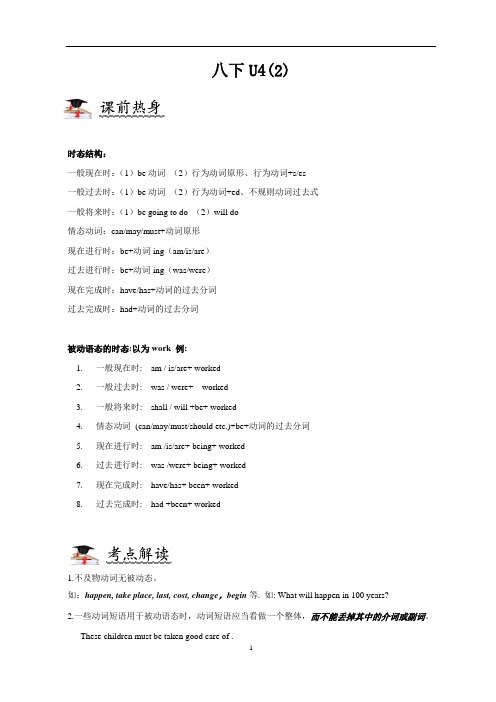
八下U4(2)时态结构:一般现在时:(1)be动词(2)行为动词原形、行为动词+s/es一般过去时:(1)be动词(2)行为动词+ed、不规则动词过去式一般将来时:(1)be going to do (2)will do情态动词:can/may/must+动词原形现在进行时:be+动词ing(am/is/are)过去进行时:be+动词ing(was/were)现在完成时:have/has+动词的过去分词过去完成时:had+动词的过去分词被动语态的时态:以为work 例:1. 一般现在时: am / is/are+ worked2. 一般过去时: was / were+ worked3. 一般将来时: shall / will +be+ worked4. 情态动词(can/may/must/should etc.)+be+动词的过去分词5. 现在进行时: am /is/are+ being+ worked6. 过去进行时: was /were+ being+ worked7. 现在完成时: have/has+ been+ worked8. 过去完成时: had +been+ worked1.不及物动词无被动态。
如:happen, take place, last, cost, change,begin等. 如: What will happen in 100 years?2.一些动词短语用于被动语态时,动词短语应当看做一个整体,而不能丢掉其中的介词或副词。
These children must be taken good care of .3.带双宾语的动词的被动态:直接宾语(物)作主语,那么动词后要用介词to 或for.在动词send, pass, give, post 等词后加to; 而在动词buy,sing, make, cook 等词后面加for.如:She gave me a book. A book was given to me by her.My mother bought me a new bike. A new bike was bought for me by my mother.二、主动形式表示被动意义1.有些动词可以用主动态形式表示被动语态。
沪教牛津版八年级下Unit2讲解与练习

---沪教牛津版八年级下Unit 2 解说及练习基础知识:短语1.the use of...... ......的用途2.body language肢体语言3.in communication在沟通中4.Make/accept/reject suggestions 提出、接受、拒绝建议5.the meaning of........的含义6.take place 发生7.look down 俯视8.look up 仰望、查问9.sit up straight坐直身体10.look bored 看上去无聊11.a part-time job 一份兼员工作12.a well-dressed lady 一位衣着考究的女士13.walk over 走向 ....14.instead of 代替15.at once 立刻16.make a good impression on sb 给某人留下好印象17.remind sb of sth提示某人某事18.at the moment此时19.think it over屡次考虑20.start/end with以...... 开始 /结束21.because of因为22.according to依照23.the type of...... ...种类的24.refer to 描绘25.at an early age在很小的时候26.be angry 生气27.be good at擅长municate with sb 和某人沟通29.a bit 一点儿、稍微30.far away from离....远31.be unhappy about sth 对某事不快乐32.for example比方33.too much 太多( +名词)34.feel nervous感觉紧张35.set up 成立、成立36.take part in 参加句型1.shake hands with sb 与某人握手2. What ’ s the matter?怎么了?3.make sb do sth 使某人做某事4.decide to do sth决定做某事5.try to do sth努力做某事try doing sth试一试做某事6.I think+ 从句我认为 ......7.have a good chace to do sth有好机会去做某事8. It ’s+adj+for sb to do sth对某人来说做某事是 ......9. What happened ?怎么了?10.by doing sth经过做某事11.look forward to doing sth希望着做某事12.be interested in doing sth对做某事感兴趣13.Why not do sth?= Why don ’tyou do sth? 为什么不做某事?14. What about doing sth ?做某事怎么样?15.had better do sth 最好做某事16.keep doing sth 素来做某事17.think about doing sth 考虑做某事18.somewhere nice某个宜人的地方19.as...as 和...... 同样20.be easy to do sth 很简单做某事第 1 页--------语法:动名词Communicating is more than just speaking交.流不可是是说话Debbie enjoys smiling and always looks friendly.黛比喜欢微笑并且看上去总是很友好 I’m looking forward to going to Beijing. 我正希望着去北京。
八年级沪教版牛津版英语下册第1单元词汇和语法详解
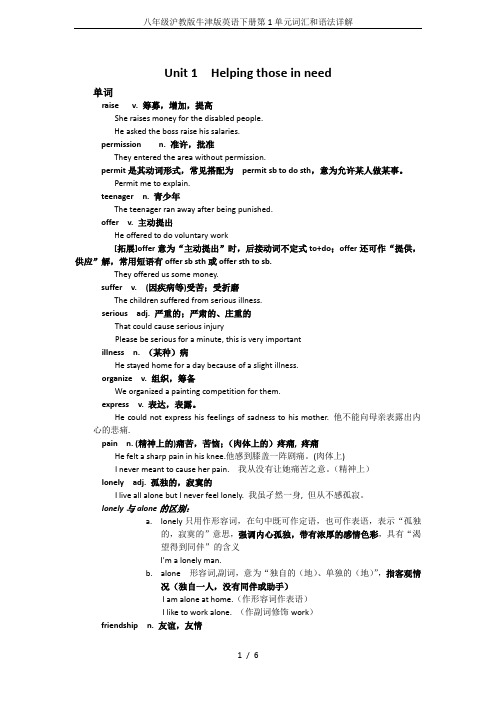
Unit 1 Helping those in need单词raise v. 筹募,增加,提高She raises money for the disabled people.He asked the boss raise his salaries.permission n. 准许,批准They entered the area without permission.permit是其动词形式,常见搭配为permit sb to do sth,意为允许某人做某事。
Permit me to explain.teenager n. 青少年The teenager ran away after being punished.offer v. 主动提出He offered to do voluntary work[拓展]offer意为“主动提出”时,后接动词不定式to+do;offer还可作“提供,供应”解,常用短语有offer sb sth或offer sth to sb.They offered us some money.suffer v. (因疾病等)受苦;受折磨The children suffered from serious illness.serious adj. 严重的;严肃的、庄重的That could cause serious injuryPlease be serious for a minute, this is very importantillness n. (某种)病He stayed home for a day because of a slight illness.organize v. 组织,筹备We organized a painting competition for them.express v. 表达,表露。
He could not express his feelings of sadness to his mother. 他不能向母亲表露出内心的悲痛.pain n. (精神上的)痛苦,苦恼;(肉体上的)疼痛, 疼痛He felt a sharp pain in his knee.他感到膝盖一阵剧痛。
沪教牛津版八年级英语下册语法精讲及练习

沪教牛津版八年级英语下册语法精讲及练习语法知识现在进行时一.现在进行时表示的意义:1.表示现在(说话瞬间)正在进行或发生的动作,强调动作发生的时间是此时此刻。
例如;I am reading an English book. 我正在看一本英语书。
She is watching TV. 她正在看电视。
2.表示目前一段时间内的活动或现阶段正在进行的动作。
例如:What lessons are you studying this week? 你们本周学哪些课了?Tom’s parents are working in China this year. 汤姆的父母今年一直在中国工作。
二.现在进行时的句子结构:现在进行时由“助动词be + 动词的现在分词”构成,be (am, is, are)是助动词,不做联系动词用,不解释“是”。
其句子结构为:1.肯定句由“主语 + be + v.-ing + 其他”构成。
例如:I am cleaning the classroom. 我正在打扫教室。
They are playing the piano.2. 否定句由“主语 + be + not + v.-ing + 其他”构成。
例如:He is not watching TV. 他没在看电视。
They are not writing. 他们没在写东西。
3. 一般疑问句由“Be + 主语 + v.-ing + 其他?”构成,其肯定答句为“Yes, 主语+ be”否定答句为“No, 主语+ be + not”。
例如:—Is she listening to the music? 她正在听音乐吗?—Yes, she is. / no, she isn’t. 是的,她在听。
/ 不,她不在听。
—Are they running? 他们正在跑步吗?—Yes, they are. / No, they aren’t. 是的,他们在跑。
沪教版八年级下册初二(下)第八单元Unit8知识点语法讲解练习测试
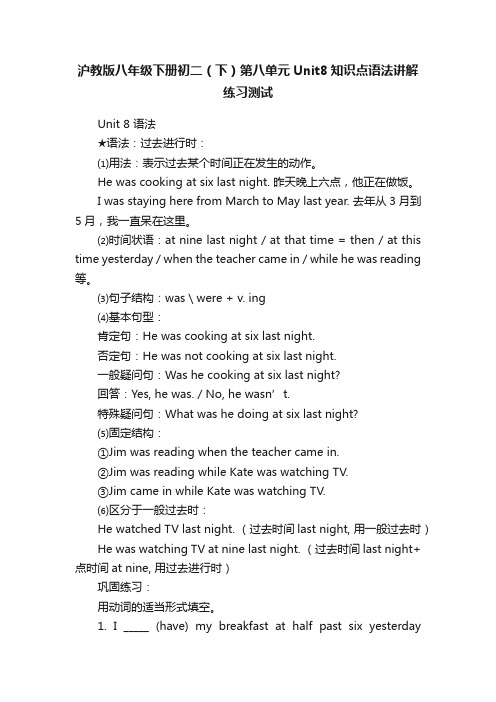
沪教版八年级下册初二(下)第八单元Unit8知识点语法讲解练习测试Unit 8 语法★语法:过去进行时:⑴用法:表示过去某个时间正在发生的动作。
He was cooking at six last night. 昨天晚上六点,他正在做饭。
I was staying here from March to May last year. 去年从3月到5月,我一直呆在这里。
⑵时间状语:at nine last night / at that time = then / at this time yesterday / when the teacher came in / while he was reading 等。
⑶句子结构:was \ were + v. ing⑷基本句型:肯定句:He was cooking at six last night.否定句:He was not cooking at six last night.一般疑问句:Was he cooking at six last night?回答:Yes, he was. / No, he wasn’t.特殊疑问句:What was he doing at six last night?⑸固定结构:①Jim was reading when the teacher came in.②Jim was reading while Kate was watching TV.③Jim came in while Kate was watching TV.⑹区分于一般过去时:He watched TV last night. (过去时间last night, 用一般过去时)He was watching TV at nine last night. (过去时间last night+点时间at nine, 用过去进行时)巩固练习:用动词的适当形式填空。
沪教牛津版八年级下Unit7讲解与练习
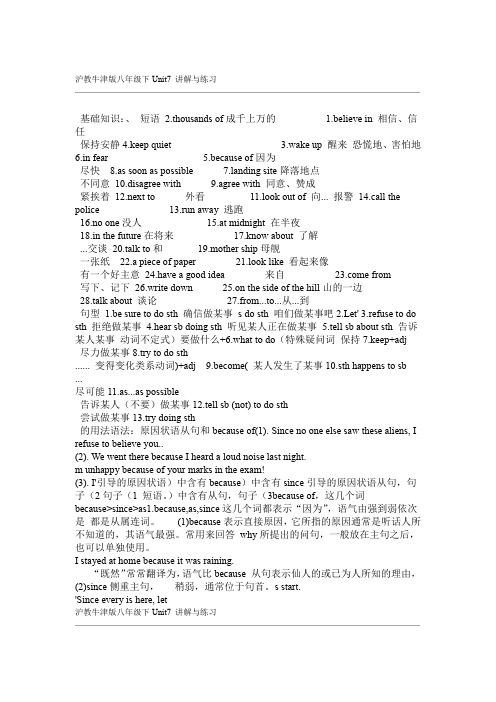
沪教牛津版八年级下Unit7 讲解与练习基础知识:、短语2.thousands of成千上万的 1.believe in 相信、信任保持安静4.keep quiet 3.wake up 醒来恐慌地、害怕地6.in fear 5.because of因为尽快8.as soon as possible nding site降落地点不同意10.disagree with 9.agree with 同意、赞成紧挨着12.next to 外看11.look out of 向... 报警14.call the police 13.run away 逃跑16.no one没人15.at midnight 在半夜18.in the future在将来17.know about 了解...交谈20.talk to和19.mother ship母舰一张纸22.a piece of paper 21.look like 看起来像有一个好主意24.have a good idea 来自e from写下、记下26.write down 25.on the side of the hill山的一边28.talk about 谈论27.from...to...从...到句型1.be sure to do sth 确信做某事s do sth 咱们做某事吧2.Let' 3.refuse to do sth 拒绝做某事4.hear sb doing sth 听见某人正在做某事5.tell sb about sth 告诉某人某事动词不定式)要做什么+6.what to do(特殊疑问词保持7.keep+adj 尽力做某事8.try to do sth...... 变得变化类系动词)+adj 9.become( 某人发生了某事10.sth happens to sb ...尽可能11.as...as possible告诉某人(不要)做某事12.tell sb (not) to do sth尝试做某事13.try doing sth的用法语法:原因状语从句和because of(1). Since no one else saw these aliens, I refuse to believe you..(2). We went there because I heard a loud noise last night.m unhappy because of your marks in the exam!(3). I'引导的原因状语)中含有because)中含有since引导的原因状语从句,句子(2句子(1 短语。
牛津沪教版初中英语八年级英语下unit-3-traditional-skills重难点及语法总结巩固

牛津沪教版初中英语八年级英语下Unit-3-Traditional-skills重难点及语法总结巩固训练Unit 3 Traditional skills温故知新1. 按照要求写单词。
describe (v.) - (n.) hang(v. 悬挂) ---- (过去式)-- (过去分词)hang (v. 绞死) -- (过去式)- (过去分词) fit (同义词)----____________ simple(同义词)----________ reach ( 同义词组) __---- _______________luck(n.) ---- (adj.) --- (adv.) lucky (反义词)----____________ attract (v.) -- (adj.) ----___________(n.) 尽管_____需要_____________ 剪刀 __________有吸引力的,迷人的_ 文字;符号;人物;角色_____2. 根据句意及首字母提示完成单词。
1. What does your father look like Can you d______________her2. Tom often takes exercises, so he is very f_________.3. You need a pair of s_____________ to make paper cutting.4. Tom’s flight will r__________ Shenzhen at 10:00..5. My father is a f___________. He makes a living b fishing.6. Mount Tai has many l__________ scenes.7. The story is written in s___________ English.8. His grandfather is in bad h__________.9. The work r__________ more time and people..10. Paper cutting a______________ children’s attention.3. 用所给词的适当形式填空。
沪教牛津版八年级下Unit4讲解与练习

基础知识:基础知识:短语短语ic strip 连环漫画连环漫画2.pop out 张大、瞪大、瞪起张大、瞪大、瞪起3.decide on 决定、选定决定、选定4.video camera 摄像机摄像机5.play against 同....比赛比赛6.weather forecast 天气预报天气预报7.thank goodness 谢天谢地谢天谢地 8.make it 获得成功获得成功9.think of 考虑、想起、记得考虑、想起、记得 10.have a good idea 有个好主意有个好主意11.think about 思考、考虑思考、考虑 12.add...to... 把...添加到.... 13.sound effects 音响效果音响效果 14.at the underground station 在地铁站在地铁站15.look like 看上去像看上去像 16.a little 一点儿一点儿17.put...together 把...放在一起放在一起 18.show sth to sb 给某人看某物给某人看某物19.play football 踢足球踢足球 20.the same as 和...一样一样21.be different from 与...不同不同 22.look funny 看起来有趣看起来有趣23.a pare of 一双一双一双 24.at the top of...在...的顶部的顶部25.look out 当心当心 26.be careful 小心小心27.watch out 注意注意 28.pick up 捡起捡起29.in trouble 在困境中在困境中 30.good luck 好运好运句型句型1.need to do sth 需要做某事需要做某事 need sb to do sth 需要某人做某事需要某人做某事2.forget to do sth 忘记做某事忘记做某事 forget doing sth 忘记做过某事忘记做过某事忘记做过某事 3.appear to do sth 像是在做某事像是在做某事 4.be used to to sth 被用来做某事被用来做某事5.be ready to do sth 准备好做某事准备好做某事6.ask sb to do sth 要求某人做某事要求某人做某事7.how to do sth 如何做某事如何做某事8.let 8.let’’s do sth 让我们做某事吧让我们做某事吧让我们做某事吧 9.a comic strip called... 一个叫做...的连环漫画的连环漫画10.tell sb (not) to do sth 告诉某人(不要)做某事告诉某人(不要)做某事语法:被动语态(二)语法:被动语态(二)1. It can be enjoyed by everyone. 2. Each picture should not be made the same as the one before it. 3. The cartoon characters have been drawn carefully by the artists. 上面的三个句子都属于被动语态,前两个句子是含有情态动词的被动语态,最后一个句子是现在完成时的被动语态。
沪教牛津版八年级下Unit6 讲解与练习
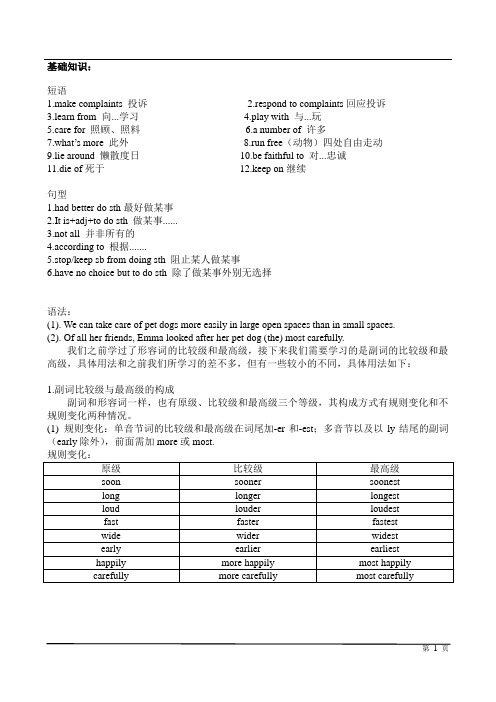
基础知识:短语1.make complaints 投诉2.respond to complaints回应投诉3.learn from 向...学习4.play with 与...玩5.care for 照顾、照料6.a number of 许多7.what’s more 此外8.run free(动物)四处自由走动9.lie around 懒散度日10.be faithful to 对...忠诚11.die of死于12.keep on继续句型1.had better do sth最好做某事2.It is+adj+to do sth 做某事......3.not all 并非所有的4.according to 根据.......5.stop/keep sb from doing sth 阻止某人做某事6.have no choice but to do sth 除了做某事外别无选择语法:(1). We can take care of pet dogs more easily in large open spaces than in small spaces.(2). Of all her friends, Emma looked after her pet dog (the) most carefully.我们之前学过了形容词的比较级和最高级,接下来我们需要学习的是副词的比较级和最高级,具体用法和之前我们所学习的差不多,但有一些较小的不同,具体用法如下:1.副词比较级与最高级的构成副词和形容词一样,也有原级、比较级和最高级三个等级,其构成方式有规则变化和不规则变化两种情况。
(1) 规则变化:单音节词的比较级和最高级在词尾加-er和-est;多音节以及以ly结尾的副词(early除外),前面需加more或most.规则变化:原级比较级最高级soon sooner soonestlong longer longestloud louder loudestfast faster fastestwide wider widestearly earlier earliesthappily more happily most happilycarefully more carefully most carefully不规则变化原级比较级最高级well better bestbadly worse worstlittle less leastmuch more mostfar farther/further farthest/furthest 2.副词比较级的用法(1)单独使用Try to do it better next time.Please speaker more slowly.(2)和than一起使用He swims better than I do.He works less than he used to.Can you do it any better than that?(3)比较级前可有状语修饰You must work much faster.He walked no further.She could dance even more gracefully than a dancer.3.as...as和not so...as结构(1)as...as可用在肯定句中,表示“和...一样”,中间要用原级。
- 1、下载文档前请自行甄别文档内容的完整性,平台不提供额外的编辑、内容补充、找答案等附加服务。
- 2、"仅部分预览"的文档,不可在线预览部分如存在完整性等问题,可反馈申请退款(可完整预览的文档不适用该条件!)。
- 3、如文档侵犯您的权益,请联系客服反馈,我们会尽快为您处理(人工客服工作时间:9:00-18:30)。
语法知识现在进行时一.现在进行时表示的意义:1.表示现在(说话瞬间)正在进行或发生的动作,强调动作发生的时间是此时此刻。
例如;I am reading an English book. 我正在看一本英语书。
She is watching TV. 她正在看电视。
2.表示目前一段时间内的活动或现阶段正在进行的动作。
例如:What lessons are you studying this week? 你们本周学哪些课了?Tom’s parents are working in China this year. 汤姆的父母今年一直在中国工作。
二.现在进行时的句子结构:现在进行时由“助动词be + 动词的现在分词”构成,be (am, is, are)是助动词,不做联系动词用,不解释“是”。
其句子结构为:1.肯定句由“主语 + be + v.-ing + 其他”构成。
例如:I am cleaning the classroom. 我正在打扫教室。
They are playing the piano.2. 否定句由“主语 + be + not + v.-ing + 其他”构成。
例如:He is not watching TV. 他没在看电视。
They are not writing. 他们没在写东西。
3. 一般疑问句由“Be + 主语 + v.-ing + 其他?”构成,其肯定答句为“Yes, 主语 + be”否定答句为“No, 主语 + be + not”。
例如:—Is she listening to the music? 她正在听音乐吗?—Yes, she is. / no, she isn’t. 是的,她在听。
/ 不,她不在听。
—Are they running? 他们正在跑步吗?—Yes, they are. / No, they aren’t. 是的,他们在跑。
/ 不,他们不在跑。
4. 特殊疑问句由“特殊疑问词 + be + 主语 + v.-ing + 其他?”构成。
例如:What are you doing? 你们正在做什么?Who is he talking to? 他正在和谁谈话?三.现在分词的构成:1.直接在动词原形末尾加-ing。
例如:teach—teaching play—playing look—looking go—going2.以不发音的字母e 结尾的动词,先去掉e 再加-ing。
例如:write—writing take—taking live—living give—giving3.以重读闭音节结尾的动词,且末尾只有一个辅音字母时,应双写该辅音字母再加-ing。
例如:put—putting run—running begin—beginning swim—swimming四.现在进行时的标志:1.句中有副词now时,,常表示动作正在进行,这时要用现在进行时。
例如:The children are playing football now. 孩子们现在正在踢足球。
2.句首有look, listen 提醒注意时,提示我们动作正在进行,这时要用现在进行时。
例如: Look! A train is coming. 看!火车来了。
Listen! He is reading. 听!他正在朗读。
3.句首有表示钟点的时间时,提示动作正在进行,这时要用现在进行时。
例如:It’s six o’clock. My mother is cooking breakfast. 现在六点了,我妈妈正在做早餐。
4.根据语境或上下文理解,如果是动作正在进行,这时要用现在进行时。
例如:Don’t make noise. The baby is sleeping. 不要吵,婴儿正在睡觉。
五.没有进行时态的动词:在英语中有一些动词没有或很少有进行时态。
到目前为止,我们学过的没有进行时态的动词可分为以下几类:1. 表示感觉的感官动词,如see“看见”,hear“听见”,find “找到”,notice“留意”等。
例如:Do you hear the noise of a plane?你听到飞机的声音了吗?We see him. 我们看见他了。
注意:有些表示感观的动词,如listen to, look at强调的是听和看的动作,而不是结果,所以可用于现在进行时态中。
例如:They are listening to the teacher. 他们在听老师讲课。
2.表示态度和感情,心理状态等意思的动词,如like“喜欢”,love “爱”,know “知道”,want“想要”,hope“希望”,hate“恨”,think“认为”,believe“相信”等。
例如: I like dog. 我喜欢狗。
I want to go out for a walk now. 我现在想出去散步。
3.当have, has 表示“拥有”时。
例如:I have a lot of books. 我有许多本书。
注意:当have, has 表示“吃饭;开会;玩得痛快”等意思时,可用于进行时态。
例如: We are having a good time. 我们玩得很愉快。
4. 表示状态的be动词“是”。
例如:He is at home. 他在家里。
六.现在进行时和一般现在时的区别:1.时间状语:(1)一般现在时表示经常性、习惯性的动作或状态,强调的是经常性和习惯性,通常与always, often, sometimes, usually 等频度副词以及in the day, in the morning / afternoon / evening, on Sundays, at weekends 等短语连用。
例如:My father often reads books after dinner. 我父亲经常饭后看书。
(2)现在进行时表示讲话时或目前一段时间内正在发生的事情,通常与now, these days, at this time 等时间状语连用。
例如:He is playing the piano now. 他现在正在弹钢琴。
Look! They are watching TV. 看!他们正在看电视。
2.谓语动词:(1)一般现在时谓语动词的构成有三种情况:be动词用am, is, are;实意动词用原形或第三人称单数形式;情态动词 + 动词原形。
例如:My brother is a policeman. 我的哥哥是一名警察。
(be动词用is)She doesn’t wear a white uniform.她不穿白色工作服。
(实意动词用单数第三人称形式)He can speak English. 他会说英语。
(情态动词 + 动词原形)(2)现在进行时的谓语动词构成为:be (am, is, are) + v.-ing 。
例如:Are you cleaning the classroom? 你正在打扫教室吗?She is eating dinner. 她正在吃饭。
现在进行时专练II. 用括号中动词的适当形式填空:1. My parents _______(watch)TV now.2. Look. Three boys _______(run).3. What _______ your mother _______(do)now? 4. _______ your dog _______ now?(sleep)5. _______ you _______(listen)to music? Yes, I am.6. Look, Miss Chen _______ football.(play)7. Tom and his sister _______(wait)for you over there.8. Now Class 3 and Class 4_______(have)a test.9. Listen, someone _______(sing)in the classroom.10. ——Where is Zhang Yan?——She _______(talk)with her teacher in the teacher’s office.III. 选择填空:()1. Who ______ over there now? A. singing B. are sing C.is singing()2. It’s nine ten. The students ______ a music class.A. haveB. havingC. are having()3. Listen! The boy _______. A. crying B. is crying C. cri es()4. Don’t talk here. Grandparents ______.A. sleepB. is sleepingC. are sleeping()5. Is the man _______ tea or milk? A. drinks B. drink C.drinkingIV. 按要求进行句型转换:1. Look! Lily is dancing.(改为一般疑问句)________________________________________________2. Kate is looking for her watch.(改为否定句)________________________________________________3. Mrs White is watching TV.(对划线部分提问)________________________________________________4. I am doing homework.(改为否定句)________________________________________________5. They are waiting for you at the library.(就划线部分提问)________________________________________________V. 根据中文提示完成句子:1. 小花不是在写作业,她在画画。
Xiao Hua ______ ______ homework. She ______ ______ pictures.2. 今天李老师穿着一件红色的连衣裙。
Miss Li ______ ______ a red dress today.3. 你爷爷在看报纸吗?______ your grandpa ______ the newspaper?4. Tom和Jim在做什么?______ ______ Tom and Jim ______?5. 他们是在打篮球还是在打排球?______ they ______ basketball ______ volleyball?6. 孩子们在干什么?他们在唱歌、跳舞。
